The testimony of over 160 gymnasts in the trial of Dr. Larry Nassar provides a frame for a discussion about media literacy and sexual harassment. These conversations aren’t easy, but they’re playing out on a national stage, and at every dinner table in the country right now. So take advantage of the moment to dig into conversations with your tweens and teens about all of it – the #metoo movement, the power of women’s voices, and how to protect their own safety and sexuality. And, here are tips for talking with tweens and teens – who are probably eager for some straight talk but not sure how to broach the subject. Hint: listening is as important as talking in these conversations. And, be sure to build the idea of news literacy into the conversation – helping kids learn to unpack what they are hearing is key in this age of unreliable new sources and an overly saturated media landscape.
You don’t have to delve into the sordid details of these upsetting cases with kids that are very young – here are tips from Common Sense Media about how to address the topic if it comes up with very young kids. Hint: Don’t over explain!
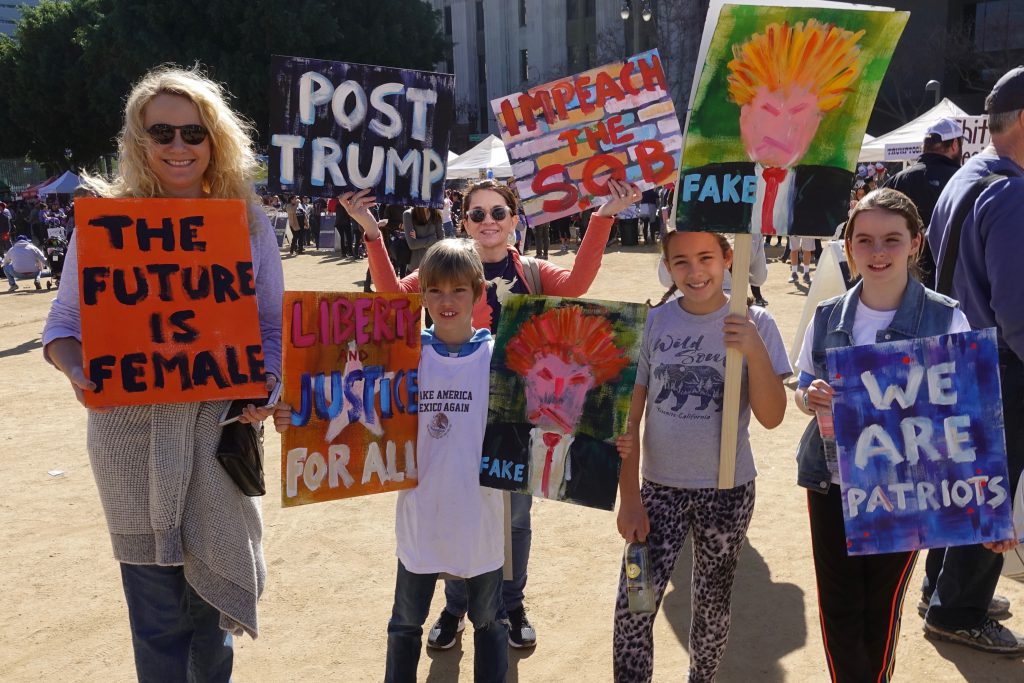 Fortune magazine reports that 500,000 Angelenos streamed through downtown streets last Saturday for the Women’s March – the largest gathering in the nation. Angelenos of every sex, shape, and color turned out with signs and smiles, bookending the first year of Trump’s presidency with another massive protest march. The inspired signage told a story of a severe loss of faith in our president. But, something else was apparent in the many serene faces of those gathered – a palpable, peaceful sense of community. From words spoken on the stage to the hopeful face of kids, a feeling of inclusiveness and calls to exercise the power of the vote (“Grab Him By the Midterms”) was on display. While last year, marchers were in shock and felt angry about the election, this year the crowd was calmer, connected, and empowered.
Fortune magazine reports that 500,000 Angelenos streamed through downtown streets last Saturday for the Women’s March – the largest gathering in the nation. Angelenos of every sex, shape, and color turned out with signs and smiles, bookending the first year of Trump’s presidency with another massive protest march. The inspired signage told a story of a severe loss of faith in our president. But, something else was apparent in the many serene faces of those gathered – a palpable, peaceful sense of community. From words spoken on the stage to the hopeful face of kids, a feeling of inclusiveness and calls to exercise the power of the vote (“Grab Him By the Midterms”) was on display. While last year, marchers were in shock and felt angry about the election, this year the crowd was calmer, connected, and empowered.
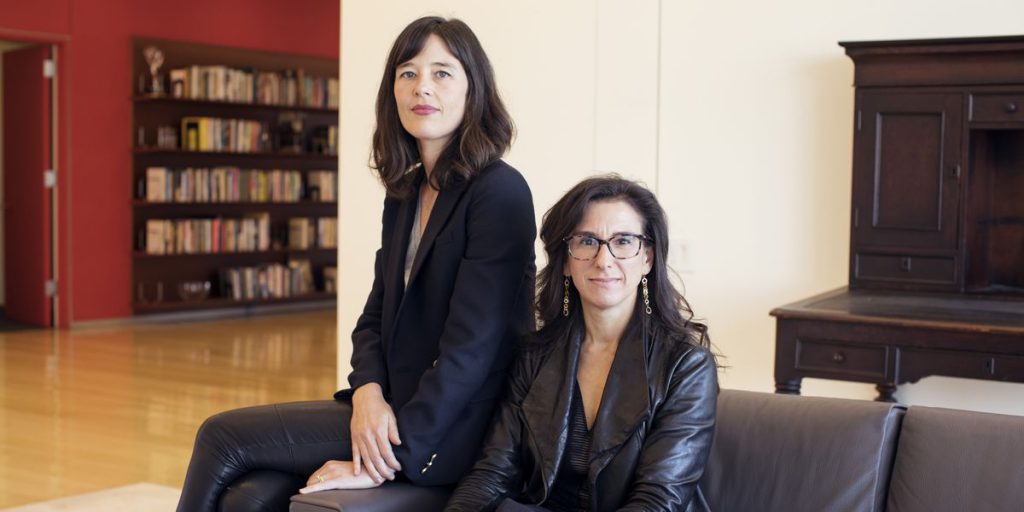
Jodi Kantor and Megan Twohey // Image by Katharina Poblotzki
2017 was remarkable in many ways, but there’s little doubt that women’s voices rose stronger and louder as the year progressed. The sound from nationwide Women’s Marches last January was a warm-up, and the nation exploded in shock with the Harvey Weinstein scandal, and then crescendoed with sympathy and support for the #meToo movement. I would even credit the box office success of the female directed Wonder Women as turning up the volume. Thanks in large part to the two female reporters at the New York Times who broke the Weinstein story, a force has been unleashed: women’s voices are being encouraged. And listened to. They are more powerful than ever, especially when raised in unison, and even better in harmony with the voices of good men.
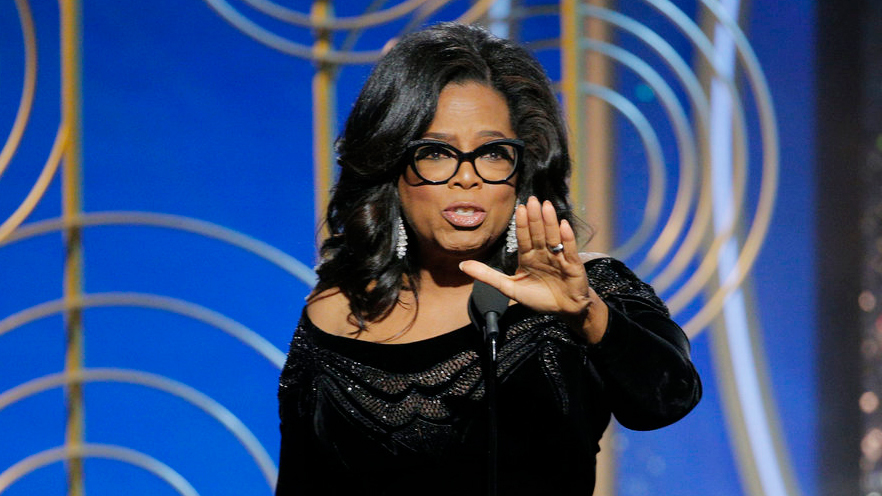
75th ANNUAL GOLDEN GLOBE AWARDS — Pictured: Oprah Winfrey, Winner, Cecil B. Demille Award at the 75th Annual Golden Globe Awards held at the Beverly Hilton Hotel on January 7, 2018 — (Photo by: Paul Drinkwater/NBC)
As we turn the page to 2018, the movement continues. The Golden Globes were spectacularly female – and not just because all the presenters coordinated their gowns and brought female activists to stand at their side (a nice move). The content of the movies and television shows that won were female-driven – from Lady Bird to Big Little Lies to Three Billboards to I Tonya and The Handmaid’s Tale. Women’s stories. Oprah’s Golden Globe speech encouraged women to continue to speak truth and provided a poignant reminder of how much we need a leader who lays out a path to decency. One who articulates the power of our democracy, instead of bullying and making fun of others. As a society, we need our ideals to be articulated and exalted and traditionally, this role has been filled by Presidents, both Republican and Democrat. But in the absence of any moral leadership from the White House, where do we turn for leadership?
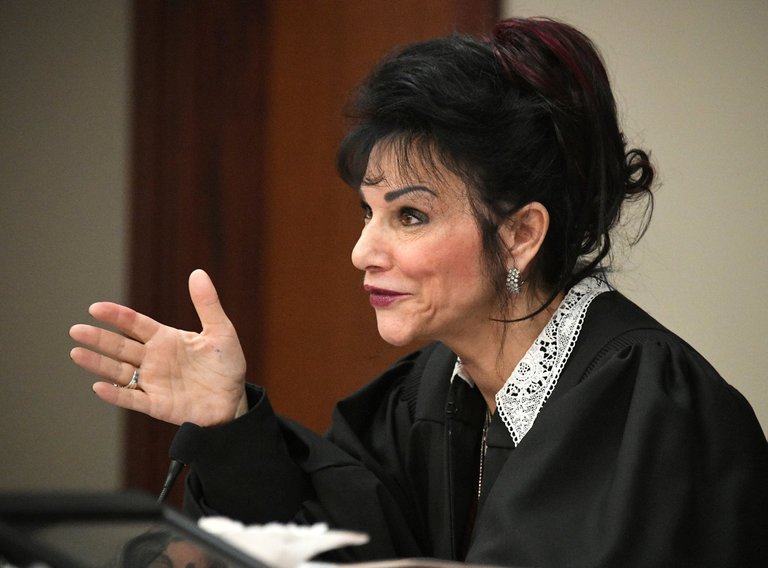
Credit Dale G. Young/Detroit News, via Associated Press
Turns out, there is leadership in many places and seemingly small acts can be amplified. This past week has provided an extraordinary and cathartic example of the power of letting women speak. Judge Rosemarie Aquilina allowed over 150 young women to testify in the sex crimes trial of Lawrence G. Nassar, the USA Olympic team doctor. Read about her here. By allowing them to be heard, she offered them healing. After listening to each of them, and thanking them for what they had to say, she sentenced Nassar to 175 years in prison. It was an unusual legal move, as you can hear from a podcast from The Daily with Emily Bazelon.
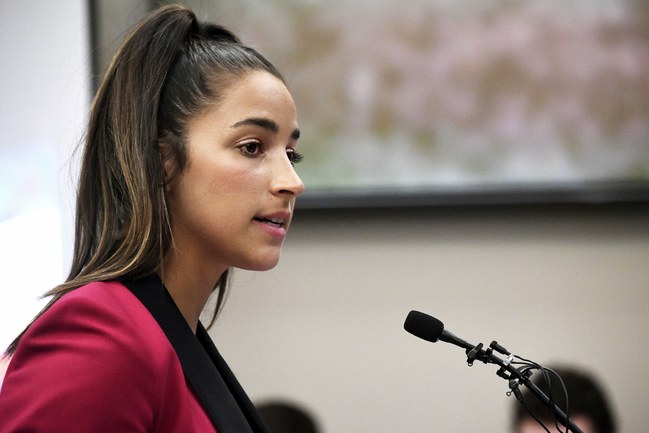
Photograph by Dale G. Young / Detroit News / AP
So, given the unthinkable and truly alarming details of this case, how do you talk with tweens and teens about this story? An obvious lens on the story is through Ali Raisman, a two-time Olympian, who has provided steadfast leadership to her teammates throughout years of this horrible ordeal. Called Grandma Aly by her teammates, she is a true Wonder Woman and the conversation should focus on her natural leadership skills, her clear articulation of truth and how they were used to bring down a predator in the midst of the gymnastics universe is a fine way to start.
Here is a short profile from a recent New Yorker.
And, here is Aly Raisman’s entire testimony which is worth 12 minutes of your day.

